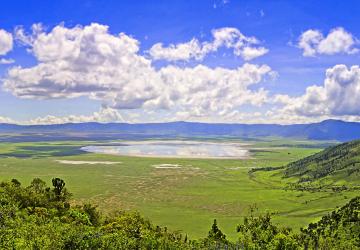A partnership between the UVic Department of Geography and The Kesho Trust
When and Where
2020 Field School: August 5th - 29th
Places visited: Arusha, Enduimet Wildlife Management Area, Tarangire National Park, Serengeti National Park, Ngorongoro Conservation Area, rural field camps (Tanzania)
How to Apply
Application Deadline: January 31, 2020 @ 2:00 pm
To apply for this field school, please submit the following:
- A completed Application Form
- A signed Field School Waiver Form
- Your Statement of Travel Experience (details on the application form)
- Your Statement of Goals & Rationale (details on the application form)
- Your Current Résumé highlighting your various experiences (2 pages maximum)
- A $500 Deposit Fee (see application form for details)
We will continue to accept applications after the deadline only if space is available.
Contact geoginfo@uvic.ca if you have any questions.
Program Overview
For a full program description (including tentative itinerary), see the Information Sheet.
Tanzania provides an internationally-recognized array of natural resources and conservation areas and initiatives within a rapidly expanding population and challenging development context. The Tanzania Field School provides an exceptional experiential education opportunity for UVic students. The travel-study program focuses on conservation and development in predominantly rural environments and engaging with local people.
The exciting itinerary includes experience in some of the most iconic natural environments in the world (the Serengeti and Ngorongoro) and with one of the most globally recognized cultures (the Maasai). From major tourism attractions to some very out of the way places, this program will challenge your perceptions and thinking about conservation, development and Africa.
More information on last year's inaugural offering here.
Eligibility:
- The field school is open to UVic students who have completed two years of undergraduate study (students undertaking study at a different Canadian institution will also be considered on a case by case basis; however, students from UVic will be given priority, as will students studying in the fields of Geography and/or Environmental Studies) - to be considered for special permission, contact the field school instructor, Phil Dearden (pdearden@uvic.ca).
- Priority will be given to students with interest in the subject matter – conservation and sustainable community development.
If you have any further questions, please email Phil Dearden (pdearden@uvic.ca) or Bruce Downie (bkdownie@uvic.ca).
Courses
This field program consists of three courses - applications for individual courses will not be accepted.
Each course is worth 1.5 credits, for a total of 4.5 credits. Successful applicants will be registered in the course through special registration by the Department of Geography (students will not register themselves).
1. Geog 347B - Geographies of Development
2. Geog 388 - Regional Studies: Africa
3. Geog 391 - Topics in Geography: Conservation in a Crowded World
Field School Fees
For field schools, students pay regular UVic tuition plus field school fees.
Field school fees can be paid by cheque, money order, counter cheque, or cash ONLY. Cheques should be made payable to the University of Victoria. Payment can be dropped off at the Geography main office (David Turpin Building, room B203) or mailed (cheques only).
Field school fees*:
- $500 deposit paid at time of application
- $3000 paid by June 1st, 2020
*All field school fees are subject to change between offerings.
Field school fees include:
- Accommodation for August 5th - August 28th, 2020 (itinerary subject to change)
- Most meals (breakfasts, dinners, most lunches)
- Activity costs (entry admissions, guide and workshop fees, presenters’ fees)
- Airport pick-up
- Ground transportation
Field school fees do not include:
- Tuition
- Airfare
- Some lunches (snacks while travelling will be the responsibility of the student)
- Travel insurance (check with your insurance provider to see if you are covered)
- Other expenses such as entertainment or any personal gear (e.g. hiking shoes) required for the course
Financial Support
We strongly encourage students to apply for the Social Sciences Field Course Support Fund if they have financial need. These funds are distributed according to demonstrated financial need and the fit of the field course(s) to your career development. These funds can help pay for the field course fees (but not tuition). Email soscassist@uvic.ca for more details.
You may find other funding opportunities through UVic International.
*PLEASE NOTE*: Students applying for field school funding support must do so within ONE WEEK of being accepted.



